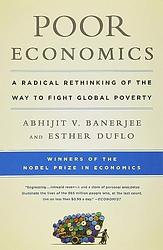Poor Economics by Abhijit V. Banerjee, Esther Duflo
This book delves into the complex world of poverty, challenging conventional wisdom and assumptions about the economic decisions of the poor. Through rigorous analysis and empirical evidence, the authors explore how the poor make choices regarding education, health care, savings, and investments, revealing the logic behind these decisions. They argue that understanding these choices is crucial for designing effective anti-poverty policies. The book advocates for a more nuanced, bottom-up approach to economics, emphasizing the importance of specific, targeted interventions over broad, one-size-fits-all solutions. By combining detailed field research with economic theory, it provides insightful perspectives on how to empower the world's impoverished populations.
The 9294th greatest book of all time
Ranking Details:
Our ranking system awards points to books based on their appearance and position on curated lists. Here's how it works:
Unranked Lists: For lists without specific rankings, each book receives points equivalent to the list's weight. This approach recognizes the book's inclusion on prestigious lists.
Ranked Lists: Books on ranked lists receive points in two ways:
- Base Points: Initially, every book is awarded points equal to the list's weight, acknowledging its significance.
- Bonus Points: Additionally, books earn bonus points based on their ranking. The total bonus pool, equal to 100% of the list's weight, is distributed among the books, with higher-ranked books receiving more points.
Exponential Distribution: The distribution of bonus points follows an exponential model. This means the top-ranked book (#1) receives significantly more bonus points than those further down the list (e.g., #100). Our algorithm ensures that higher placements are rewarded more generously, reflecting the achievement of a top rank on any given list.
This scoring system ensures that each book's ranking reflects both its presence on multiple lists and its positions within those lists, providing a comprehensive measure of its acclaim and popularity.
Total Points: 69
Since this book was first published in 2011, there is a penalty of 59.2%. The age adjusted score is 28.15.
This is to prevent newer books from reaching super high on the ranked list of the greatest books of all time. The greatest books should also stand the test of time.
- score: 69 -- Bill Gate's Book Recommendations (Weight: 69)

